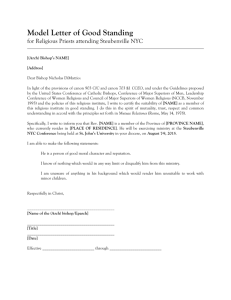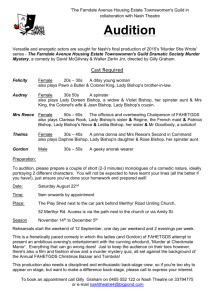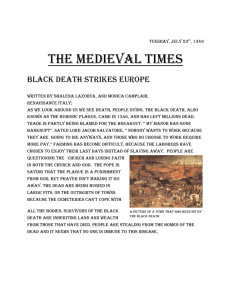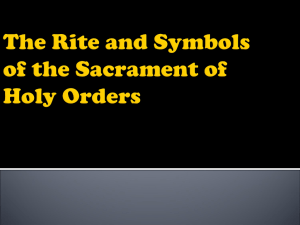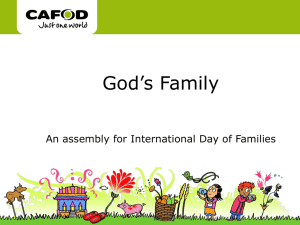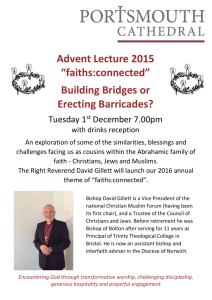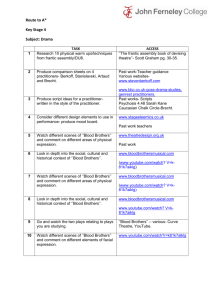Documents relating to the Order of the Knights of Christ of Livonia
advertisement
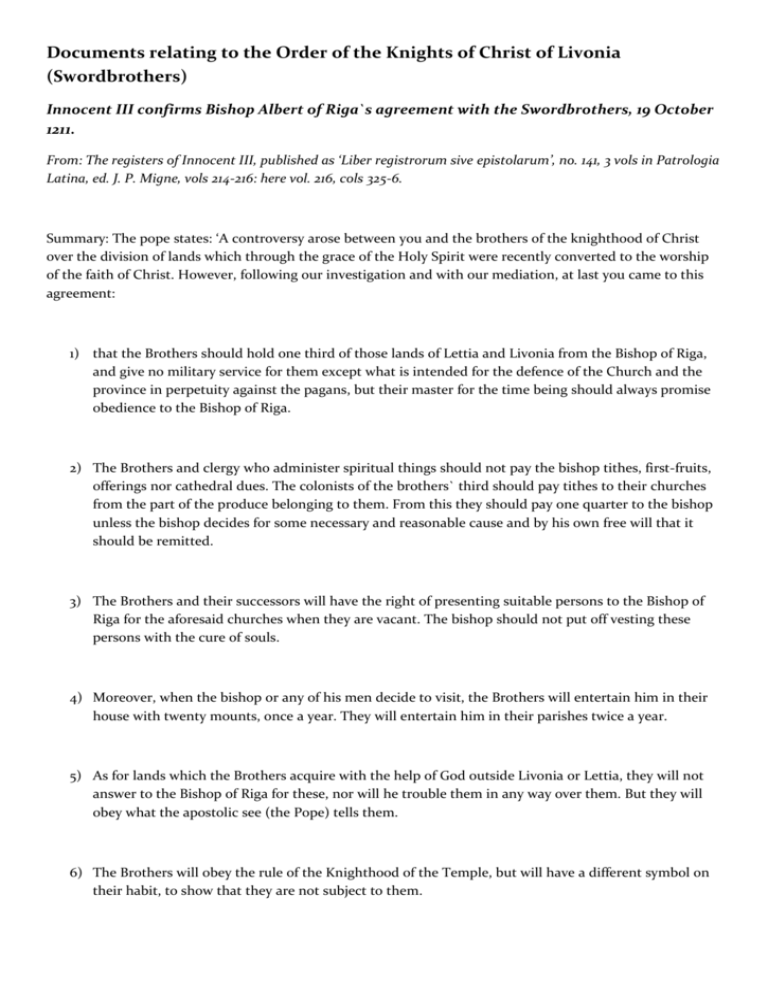
Documents relating to the Order of the Knights of Christ of Livonia (Swordbrothers) Innocent III confirms Bishop Albert of Riga`s agreement with the Swordbrothers, 19 October 1211. From: The registers of Innocent III, published as ‘Liber registrorum sive epistolarum’, no. 141, 3 vols in Patrologia Latina, ed. J. P. Migne, vols 214-216: here vol. 216, cols 325-6. Summary: The pope states: ‘A controversy arose between you and the brothers of the knighthood of Christ over the division of lands which through the grace of the Holy Spirit were recently converted to the worship of the faith of Christ. However, following our investigation and with our mediation, at last you came to this agreement: 1) that the Brothers should hold one third of those lands of Lettia and Livonia from the Bishop of Riga, and give no military service for them except what is intended for the defence of the Church and the province in perpetuity against the pagans, but their master for the time being should always promise obedience to the Bishop of Riga. 2) The Brothers and clergy who administer spiritual things should not pay the bishop tithes, first-fruits, offerings nor cathedral dues. The colonists of the brothers` third should pay tithes to their churches from the part of the produce belonging to them. From this they should pay one quarter to the bishop unless the bishop decides for some necessary and reasonable cause and by his own free will that it should be remitted. 3) The Brothers and their successors will have the right of presenting suitable persons to the Bishop of Riga for the aforesaid churches when they are vacant. The bishop should not put off vesting these persons with the cure of souls. 4) Moreover, when the bishop or any of his men decide to visit, the Brothers will entertain him in their house with twenty mounts, once a year. They will entertain him in their parishes twice a year. 5) As for lands which the Brothers acquire with the help of God outside Livonia or Lettia, they will not answer to the Bishop of Riga for these, nor will he trouble them in any way over them. But they will obey what the apostolic see (the Pope) tells them. 6) The Brothers will obey the rule of the Knighthood of the Temple, but will have a different symbol on their habit, to show that they are not subject to them. 7) The Brothers will have free burial also for the use of their Brothers and families, and also of those who choose to be buried in their house, saving the canonical portion due to the churches from which the bodies of the dead are taken (i.e. death duties payable to their own church).’ The pope approves this agreement. Confirmation by the emperor Frederick II to Volquin, master of the Swordbrothers: May 1226. From: Historia diplomatica Fridericii secundi, (new ed., Toronto, 1975), p. 229, no. 235: CR4759.S8 Summary: Frederick II, emperor, confirms to Volquin, master of the house of the knighthood of Christ in Livonia, and his brothers, all possessions and rights which they possess from the bishops of Livonia and the Isle of Oesel or will acquire justly in the future and also gives them any metal ore which can be found in the ground or above ground in that district. He says that although he ought to favour all religious men, he should especially favour those who do not only fight against invincible foes but our visible foes for exalting the faith of Christ and the religion of the Christian faith, by exposing their souls for Christ`s sake and their persons for the sake of God`s faithful. Therefore, at their request he confirms their possessions and rights: ‘considering the agonies which the master and brothers frequently sustain for the faith of Christ, and how their forces are necessary to comfort the Christian region and defend those in those parts who are newly converted to the Christian faith, for reverence of God and the sake of eternal reward...’. and the sins of himself and his family. Witness no.10 out of 17 is Brother Hermann, master of the Hospital of Saint Mary of the Teutons (i.e. the Teutonic order). Charges against the Swordbrothers, 20 November 1234. From: Les registres de Pope Gregory IX, ed. L. Auvray, 4 vols (Paris, 1896-1955), no. 2287, pp. 1201-9. Summary: This is a summarised schedule of the charges to which Nicholas, bishop of Riga, the brothers of the knighthood of Christ of Livonia [i.e., the Swordbrothers] and the citizens of Riga are to reply in the Pope’s presence. [These charges are based on the accusations with Baldwin of Alna, bishop of Semigal and papal legate, had brought against the Swordbrothers, the bishop of Riga and the merchants of Riga.] Following an investigation and judicial judgement, Baldwin of Alna, who was bishop of Semigal [in southern Livonia] and papal representative or ‘legate’ in Livonia, restored to the bishop of Riga the hostages given by the prince of Kurland [south-western Livonia] - who belong to the Church of Rome. The bishop gave to the brothers of the knighthood of Livonia and the citizens of Riga each one third of the hostages and one third of the said province and kept one third. The master and brothers are now summoned to appear in the papal court, charged with the following: 1) They restored the lands of Vironia [northern Estonia] and Gerva [Jerwia, Jerwen: to the south-west of Vironia] to Baldwin of Alna, bishop of Semigal, at the order of O., cardinal and papal legate, but later snatched them back by violence. 2) They usurped the province of Kurland, which had voluntarily converted to the Roman Church. And when Baldwin bishop of Semigal, legate of Pope Gregory IX, went to Rome they launched a raid on it, burning, looting etc. and reduced the new Christians to servitude. 3) They called in Revalia [Reval, on the north coast of Estonia] 200 merchants who were occupying lands which had been given to them in Gotland [an island in the Baltic, between Livonia and Sweden], and gave them fiefs in Gerva, in prejudice of the Roman church. 4) In order to take over the land of Vironia, they had 100 or more vassals of Vironia killed. Yet, as the people there are new converts, Veronia actually belongs to the Church of Rome. 5) At the Pope’s intervention they voluntarily restored Vironia, Gerva and Kurland to the bishop of Semigal, who was then papal legate. But afterwards they attacked these areas, in prejudice of the Church and oppressing the new converts of Gerva and Vironia. In one expedition they inflicted four hundred uncos’ worth of damage on them. [The uncus was literally an ounce; in this case it is the local currency, an ounce of silver.] Documents relating to the Teutonic order The Golden Bull of Rimini, March 1226. From: Historia diplomatica Fridericii secundi, ed. J. L. A. Huillard-Bréholles, 6 vols in 11 (Paris, 1852-61, repr. Turin, 1963), vol. 2.1, pp. 549-52. The emperor Frederick II conceeds to Hermann, master of the house of St. Mary of the Teutons [i.e., the Teutonic Order] and his brothers the authority to receive the land of Culm and all the land which Conrad Duke of Masovia and Cujavia promised and offered to the house, and also of invading Prussia and exercising due rights of the emperor without paying any service or tax. March 1226, Rimini. Summary: God, the emperor Frederick says, established his empire and government to magnify His name and amplify His faith in the Gentiles – non-Christians- so it is his (Frederick’s) duty to turn his attention to the preaching of the Gospel. As he intends to repress as well as to convert the Gentiles, he is giving an indulgence through which Catholic men may take up the labour of subjecting barbarian nations and reforming divine worship and exposing their own goods and persons in this cause. So he wishes to inform present and future men of the empire that his faithful man Brother Hermann of Salza has explained in his presence that Duke Conrad [of Cujavia-Masovia] has promised and offered them the land of Culm, which is within the frontier territory and boundaries of Prussia, intending that they should take up the work and press on with the opportunity to enter and obtain the land of Prussia for the honour and glory of the True God. But they have put off taking this gift so as to ask Frederick’s permission first. Because of the master’s prompt and displayed devotion with which he burns fervently to acquire that land for his House in order to serve the Lord, and because Frederick is confident in the master’s prudence - because he is a man powerful in work and speech and he will powerfully begin and complete the conquest for the Lord although many have already failed in the same business with greater labours - Frederick gives his authority for the invasion. He also gives the brothers his imperial rights over mountains, plains, rivers, woods and the sea, which they will hold free of all service and exaction and they will be held to reply to no one. When they have conquered the land they can take tolls, set up markets and fairs, coin money, exact tallage and other rights, etc., create judges and rectors to whom the people will be subject, both those people who convert and those who do not; and the brothers may lay down good usages and customs and hold assize and make statutes to strengthen the believers and keep the peace. The complaints of Bishop Christian against the Teutonic order. Source: Preussisches Urkundenbuch, ed. A. Philipps et al., 6 vols (Königsberg, Aalen and Marburg, 1882-1986), vol. 1.1, no.134. Pope Gregory IX writes to the bishop of Meissen, the provost of the cathedral and the provost of St. Afra, re the complaints of Bishop Christian of Prussia against the Teutonic order. 11 April 1240. Summary: He complains that: 1) The Teutonic brothers have not allowed new converts to be baptised, claiming that they can be stronger as lords of pagans than of those who believe in God. 2) The brothers afflicted with various tortures the newly-baptised and new converts who had given oaths of fealty to the bishops, unless they agreed to obey the brothers. On account of this many were forced to return to their errors (i.e. paganism) through fear. 3) They impeded pilgrims [crusaders] from building churches and ensured that those they did construct were left to the pagans. 4) Although the bishop had conceded certain episcopal rights to the brothers on certain agreements, by which the brothers undertook to enlarge the bishopric, attack the pagans and defend the preaching of the gospel of peace and the Catholic faith, the brothers did not defend him when the Prussians captured him, nor even ransom him when they received papal instructions to do so. 1) They allowed certain Prussian nobles whom they could have exchanged for the bishop to go free in exchange for money, and they killed a certain newly-converted noble, who had given his son as a hostage for the bishop, because they could not extort as much money from him as they wished. 5) While the bishop was in captivity, the brothers and some new converts invaded the bishop’s church and land, the city and castle of Sanctir, and looted all the moveable property they could find, and detained the bishop’s rights, tithes and other revenue by violence. They detained the whole of the land of Prussia, against their agreement. 6) Although they had received many benefits in the land of Culm in order to defend the honour and rights of the bishop of Prussia, they were so ungrateful that not only did they not do the due service but they prevented pilgrims from having recourse to the bishop. The bishop appealed for papal assistance. The pope gives instructions that the brothers are to cease from molesting the bishop, and give compensation for the damage they have done, especially since they are giving themselves a bad reputation for lack of devotion to God and men when they damnably persecute the bishop who is said to have increased their wealth in many respects while remaining poor himself. Duke Semovit of Masovia defends the Teutonic order. From: Preussisches Urkundenbuch, 1.2: no. 62, pp. 56-7 Duke Semovit of Masovia writes to Pope Alexander IV to protect the Teutonic order against the machinations of certain people who have attacked the brothers at the papal court. 17 July 1258. Summary: He says that as the state and prosperity and salvation of his country and the countries adjacent to their lands depend on the renown and prosperity of the Teutonic brothers, he cannot fail to be concerned about these accusations. He talks of the order`s magnificent struggles against the Prussians, with the standard of the holy cross in hand. The laws they impose on the new converts, and their rights and customs, which they teach them, do not deviate from the rite of true Christians. He does not believe that those who have left many great dignities of the world, lordships and honours, in order to spread the Christian faith, exposing not only their property but their own lives to various deaths every moment, would violate the statutes of their profession or would be found acting contrary to their profession. He asks the pope not to allow any fabricated detractions against the brothers to be repeated to his ears. Reflective Questions 1. What were the goals of the Baltic (or Northern) Crusades? _________________________________________________________________________________ _________________________________________________________________________________ _________________________________________________________________________________ _________________________________________________________________________________ 2. Do they appear to have been more or less effective than Crusades in the Holy Land? _________________________________________________________________________________ _________________________________________________________________________________ _________________________________________________________________________________ _________________________________________________________________________________ 3. What sense do you get of how the European Kingdoms viewed the Teutonic and Livonian Orders? Did their feelings towards them change overtime? If so, why do you think this occurred? _________________________________________________________________________________ _________________________________________________________________________________ _________________________________________________________________________________ _________________________________________________________________________________ _________________________________________________________________________________ _________________________________________________________________________________ _________________________________________________________________________________ _________________________________________________________________________________ _________________________________________________________________________________ _________________________________________________________________________________ _________________________________________________________________________________ _________________________________________________________________________________ _________________________________________________________________________________ _________________________________________________________________________________ _________________________________________________________________________________ _________________________________________________________________________________
